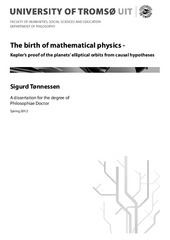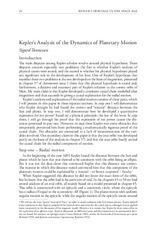| dc.contributor.advisor | Myrstad, Arnt | |
| dc.contributor.author | Tønnessen, Sigurd | |
| dc.date.accessioned | 2012-09-20T13:00:00Z | |
| dc.date.available | 2012-09-20T13:00:00Z | |
| dc.date.issued | 2012-06-07 | |
| dc.description.abstract | Johannes Kepler (1571-1630) was an iconographic scientist and one of the forefathers of the scientific revolution. His groundbreaking work on astronomy has been extensively used in the study of scientific progress. I have continued this tradition in this thesis, and have studied Kepler’s original work in order to understand his theory development. More specifically, I have studied Kepler’s analysis on planetary orbits, how he deduced the correct planetary orbits from his analyses, and what exactly his theories stated.
Kepler has been regarded as a great mathematician, but his work on the planetary orbits has been considered as being mixed with lucky guesses and mysticism. I have proved in this thesis that these prejudices are unfounded. I have demonstrated that Kepler managed to develop a coherent theory that connected force models to specific kinematical expressions, and that these expressions produced the correct elliptical orbit. I claim that Kepler proved the elliptical orbit on the basis of mathematical - physical models that introduced basic elements of classical mechanics, which were in many ways equivalent to the later Newtonian mechanics. I have also revealed several features of the sophisticated scientific method Kepler used to achieve this goal in this thesis, and I claim that Kepler´s new astronomy was not merely an introduction a new theory, but a new way of systematically analysing dynamical systems in order to reveal the underlying causes for the behaviour of the system.
In the process of his scientific work, Johannes Kepler revolutionized the natural sciences by developing some of the most elementary parts in mathematical physics and the foundations for the modern scientific method. In many ways, Johannes Kepler gave birth to mathematical physics. | en |
| dc.description.doctoraltype | ph.d. | en |
| dc.description.popularabstract | Forsking fra 1600-tallet fortsatt aktuelt
Et funn fra røttene av astronomi i 1600-tallet velter om på vår forståelse av utviklingen av klassisk fysikk, samt gir oss innblikk i hvordan teorier utvikles. Johannes Kepler (1571-1630) beviste planetlovene ved matematisk fysikk før den offisielt var oppfunnet.
I avhandlingen ”The birth of mathematical physics – Kepler’s proof of the planets’ elliptical orbit from causal hypotheses” som skal forsvares 7.6.2102 for graden PhD i filosofi, har jeg studert den tidlige astronomen og matematikeren Johannes Kepler sine originalverk for å forstå hans matematiske argumenter og årsaksforklaringer for planetbevegelsene. Dette har jeg gjort for å få innblikk i teoriutvikling og vitenskapelig metode.
Johannes Kepler var en av dem som startet den vitenskapelige revolusjonen og studier av hans arbeid ligger til grunn for mye av dagens teorier om utvikling av vitenskap. Kepler har vært ansett som en god matematiker, men arbeidet som ledet til planetlovene har tidligere blitt tolket til å være delvis basert på gjetning og overtro. Jeg beviser i mitt arbeid at Kepler utvikler flere veldefinerte matematiske lover for planetbevegelsene som på mange måter er ekvivalente med klassisk mekanikk som Newton utviklet mange år etter Kepler. Jeg viser også at han lykkes med å bevise at det kun er den korrekte elliptiske banen som tilfredsstiller disse matematiske lovene. For å oppnå disse resultatene revolusjonerte han naturvitenskapen ved å utvikle flere av de viktigste grunnelementene i matematisk fysikk samt moderne vitenskapelig metode.
Jeg, Sigurd Tønnessen (1973), har tatt både min mastergrad og doktorgrad på UiT, men har hatt gjesteopphold ved flere institusjoner både nasjonalt og internasjonalt. Ved siden av doktorgraden har jeg undervist både på Examen Philosophicum og på doktorgradskurs i vitenskapsteori ved UiT. Mine forskningsinteresser er vitenskapsteori med særlig vekt på utvikling av teorier. Målsettingen for min profesjonelle karriere har vært å både forske på og undervise i vitenskapsteori i en nær kobling til den vitenskapelige forskningsaktiviteten.
Navn: Sigurd Tønnessen
Institusjon/institutt: Institutt for Filosofi og Førstesemesterstudier, Universitetet i Tromsø
Tlf. nr. (mobil): +47 41637499
E-postadresse: sigurd.tonnessen@gmail.com | en |
| dc.description.sponsorship | Norges Forskningsråd/Norwegian Research Council (NFR, project number 161161/V20), period 01.02.2004-16.09.08. Name of project: Kepler’s and Leibniz’ development of physics – theoretical and philosophical analysis of their mathematical and dynamical arguments. | en |
| dc.description | Papers 1,2 and 4 of this thesis are not available in Munin: <br>1. Tønnessen, S.: 'Re-analysis of Kepler’s Distance Laws and the birth of
mathematical physics' (manuscript) <br/>2. Tønnessen, S.: 'Kepler’s primary measure of time in planetary orbits' (manuscript) <br/>4. Tønnessen, S.: 'A new edifice for physical science – Kepler’s proof of the elliptical orbit from physical principles' (manuscript). | en |
| dc.identifier.uri | https://hdl.handle.net/10037/4484 | |
| dc.identifier.urn | URN:NBN:no-uit_munin_4199 | |
| dc.language.iso | eng | en |
| dc.publisher | Universitetet i Tromsø | en |
| dc.publisher | University of Tromsø | en |
| dc.rights.accessRights | openAccess | |
| dc.rights.holder | Copyright 2012 The Author(s) | |
| dc.rights.uri | https://creativecommons.org/licenses/by-nc-sa/3.0 | en_US |
| dc.rights | Attribution-NonCommercial-ShareAlike 3.0 Unported (CC BY-NC-SA 3.0) | en_US |
| dc.subject | VDP::Humanities: 000::Philosophical disciplines: 160::Other philosophical disciplines: 169 | en |
| dc.subject | VDP::Humaniora: 000::Filosofiske fag: 160::Andre filosofiske fag: 169 | en |
| dc.subject | VDP::Humanities: 000::History: 070::Other history: 089 | en |
| dc.subject | VDP::Humaniora: 000::Historie: 070::Annen historie: 089 | en |
| dc.title | The birth of mathematical physics : Kepler's proof of the planets' elliptical orbits from causal hypotheses | en |
| dc.type | Doctoral thesis | en |
| dc.type | Doktorgradsavhandling | en |


 English
English norsk
norsk

